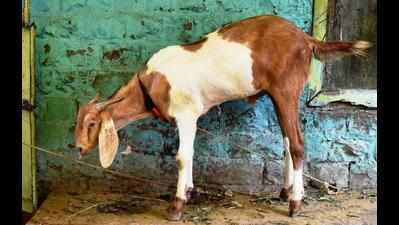- News
- City News
- nagpur News
- Bird flu scare sends mutton prices soaring
Trending
This story is from February 8, 2021
Bird flu scare sends mutton prices soaring
The bird flu scare has brought some good times for goat farmers. Like the poultry industry, goat rearing for meat is not an organized sector.

Action committee of mutton-lovers are enraged over the reluctance of the mutton shop owners to reduce the price of the mutton. Many shops are still closed
NAGPUR: The bird flu scare has brought some good times for goat farmers. Like the poultry industry, goat rearing for meat is not an organized sector.
Small farmers, mainly from villages in neighbouring districts of Madhya Pradesh, rear goats as a backyard allied agricultural activity and sell the animals at the markets in Nagpur.
Bird flu has brought down the demand for poultry meat in turn increasing that for red meat from goats.On an average, local mutton shops are selling meat at Rs700 to Rs720 a kg. This is an increase of over Rs100 since the bird flu scare began last month.
Meat traders say bird flu led to a quick increase in the demand for meat. “Traders of live animals too have increased prices,” said Mohammed Ziauddin Ansari, a broker in the goat market at Nagpur.
“Earlier, a farmer sold a live animal for Rs550 to 600 a kg, the prices have been increased by Rs100, which has been passed on to the consumer by butchers,” he said.
Saddam Ansari, a farmer from Seoni district in Madhya Pradesh, said the demand for meat due to bird flu scare has also hit the availability of animals in rural areas.
“Earlier, animals could be easily brought from villages for even 580 a kg. The rates have increased now and it’s not easy to get enough animals for the market in Nagpur either,” he said.
Poultry rates on the other hand have begun to improve slowly. Raja Dubdhade, president of Vidarbha Poultry Association, said rates of live birds have now touched Rs60 a kg. On Saturday, it was Rs55, and had touched even Rs35 to 40 earlier.
“It is still below the break-even point. Poultry farmers need to get at least Rs80 a kg to recover expenses. There is enough demand in the hotel industry but not from households,” said Dubdhade.
The awareness drive by the government that eating properly cooked meat and eggs is safe has also helped in bringing back the demand for poultry.
Small farmers, mainly from villages in neighbouring districts of Madhya Pradesh, rear goats as a backyard allied agricultural activity and sell the animals at the markets in Nagpur.
Bird flu has brought down the demand for poultry meat in turn increasing that for red meat from goats.On an average, local mutton shops are selling meat at Rs700 to Rs720 a kg. This is an increase of over Rs100 since the bird flu scare began last month.
Meat traders say bird flu led to a quick increase in the demand for meat. “Traders of live animals too have increased prices,” said Mohammed Ziauddin Ansari, a broker in the goat market at Nagpur.
Sohel Qureshi, who heads the brokers’ association, said butchers earn a margin of around Rs50 a kg. They had no choice to but to increase the rates after farmers hiked prices.
“Earlier, a farmer sold a live animal for Rs550 to 600 a kg, the prices have been increased by Rs100, which has been passed on to the consumer by butchers,” he said.
Saddam Ansari, a farmer from Seoni district in Madhya Pradesh, said the demand for meat due to bird flu scare has also hit the availability of animals in rural areas.
“Earlier, animals could be easily brought from villages for even 580 a kg. The rates have increased now and it’s not easy to get enough animals for the market in Nagpur either,” he said.
Poultry rates on the other hand have begun to improve slowly. Raja Dubdhade, president of Vidarbha Poultry Association, said rates of live birds have now touched Rs60 a kg. On Saturday, it was Rs55, and had touched even Rs35 to 40 earlier.
“It is still below the break-even point. Poultry farmers need to get at least Rs80 a kg to recover expenses. There is enough demand in the hotel industry but not from households,” said Dubdhade.
The awareness drive by the government that eating properly cooked meat and eggs is safe has also helped in bringing back the demand for poultry.
End of Article
FOLLOW US ON SOCIAL MEDIA










